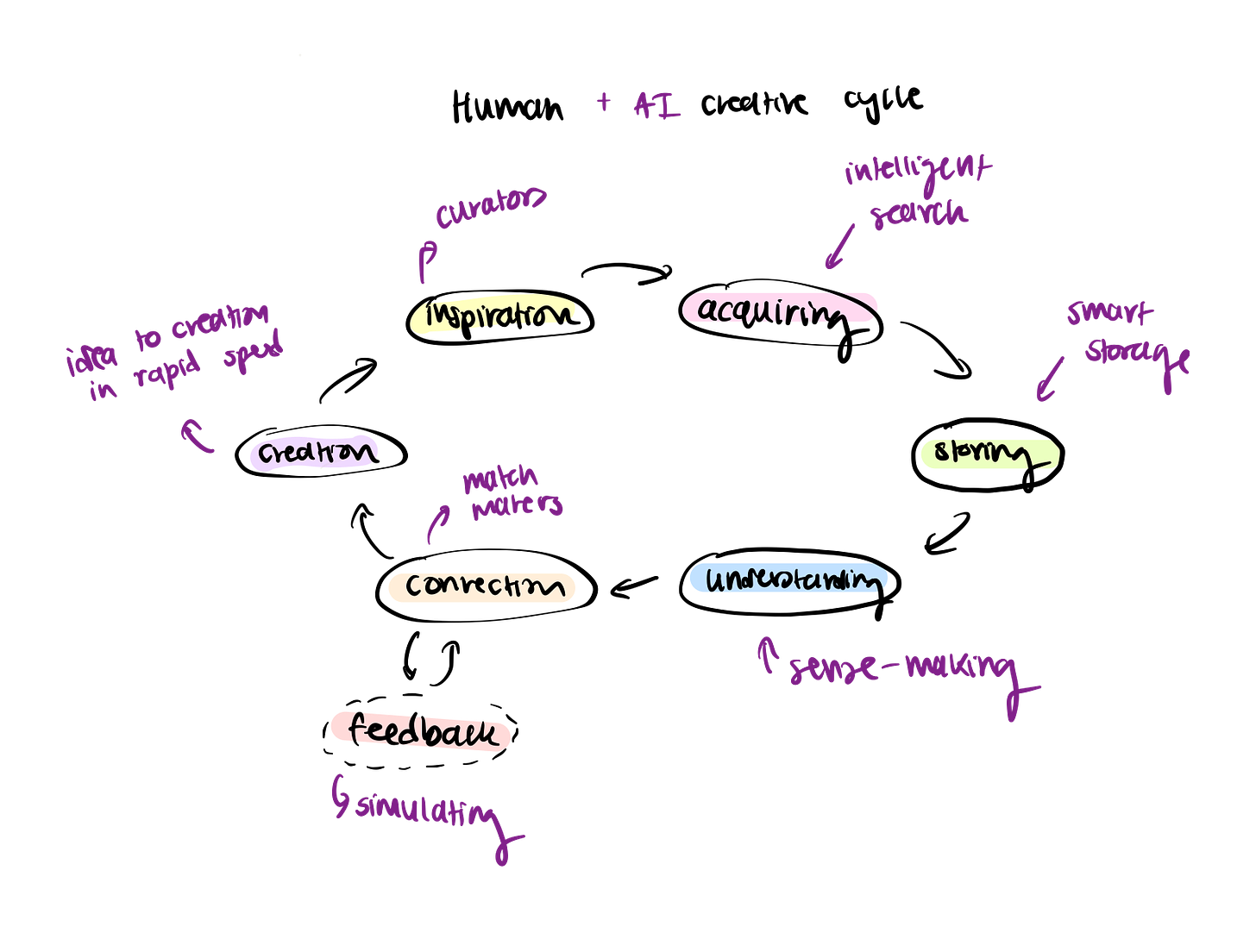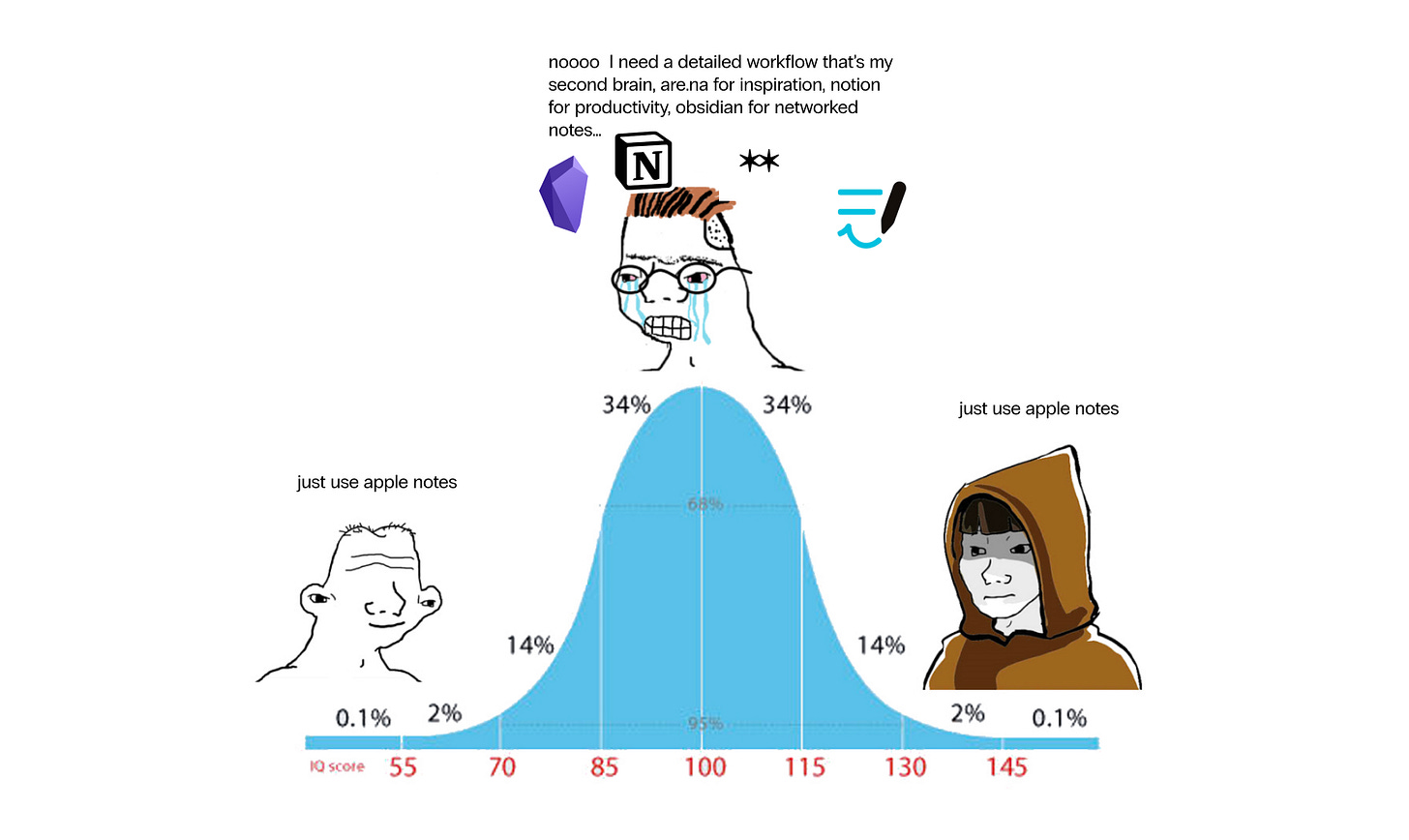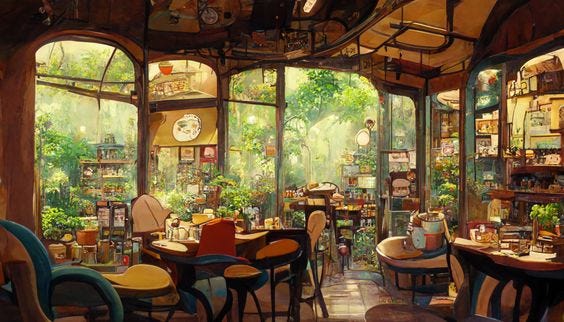ai and the human creativity cycle
because creating is better together.
hi! I’ve been mulling over a thesis on AI and creative tools for a while - this might be a shift from my regular life updates programming - but hope you enjoy and find it interesting :) let me know if you like this and if you’d like me to share more of these!
Humans are inherently creative. From religions and cultures built upon complex mythological stories and fables we’ve been retelling for centuries, to engineering laws that provide systems of how the world works, to the digital creations on the web, human creativity has been the backbone of what our world is built upon.
Most creations are realized through something I call the Human Creativity Cycle, which illustrates the journey an idea goes from seedling to tangible artifacts.
In this new shift of technology, there are opportunities to explore how AI tools intertwine with and augment the creative process. Instead of creating a completely new game, the rules have changed where we can battle with more players, with AI as co-collaborators.
breaking down the human creativity cycle
Before we delve into AI within the creative cycle, it’s important to understand the human creativity cycle in isolation.
The creative cycle starts at the root of it all - inspiration. We get inspired by the creations made by others - quotes we see on the internet, inspiring meals, novels, and cool products.
This inspiration is what motivates us to acquire knowledge. We go to school, search the corners of the internet, ask chatbots, and find more books to learn about the topic.
Then, we find ways to store information we find through drawing chicken scratches on paper, writing sticky notes, or adding it to your evergrowing bookmark list in your notes app.
Then we seek understanding - making sense of what you’ve just learned. Ideas start to become more defined, and you start to see patterns behind the information you gathered.
Once you’ve built a foundational understanding of knowledge, we explore connections. Who else is thinking of the same ideas that we are? What are other relevant ideas being explored in this space? Our list of tabs get infinitely longer, and we jump into many adjacent rabbitholes.
Inspired by our newfound connections, we embark into creation. We create all sorts of artifacts - writing, music, gardens, home cooked meals, videos, code - as products of our seeds of knowledge.
And the cycle repeats again, where other people get inspired by your creations, and embark to create things of their own.
the creative cycle is rooted in remixability
I have a few different analogies for ideas. They can be seen as nodes where new ideas are by-products of discoveries that came before us (Steal Like An Artist). New ideas can also be seen as lego blocks. We integrate old ideas from different sources, add new blocks of our own, and use our own special glue of putting them all together. Even if everyone has the same blocks, we all end up with a different sort of structure at the end.
The engineer in me loves node graphs
The same 4 blocks, but visualized in completely different ways
This inherent nature of idea building follows in creative software. Remixing and iteration are a familiar design pattern, in which the likes of Github, Replit, Tiktok duets, music mash-ups and meme-lore were built upon.
Seeing a demo on twitter is cool, but when it’s followed with a github link in the thread, that’s when I know I found a little goldmine. I click bookmark, and save it for a rainy day to dig through its contents and figure out how it was really made, fork it, and edit it for my own use.
As a creative person, one of the reasons I was so drawn to software was the open source community - building on top of the work of others is the norm - and encouraged.
Software that lowers the barrier to creating are the ones that win. It’s why tiktok has become more popular than youtube. You can create and post a tiktok video within seconds with access to popular audio at your fingertips and video creation tools integrated directly within the app.
There’s a new rise of everyday creators, who’ve swapped final cut pro and DSLR cameras for Capcut and iPhone cameras because new tools are making it easier than ever to get started.
the human creativity cycle is in for a rewrite
LLMs are built upon the same remixability principle of our creative cycles. They’re trained on the work of our predecessors and can output iterations blazingly fast.
The integration of AI in our creative cycle will fundamentally change the way we embellish our creative energy on the internet to get from idea to creation even faster.
It will democratize creation to everyone and change the way we search & store information, understand concepts, connect to new people and ideas, and how we create artifacts of that knowledge.
inspiration
AI tools as curators
I haven’t seen a lot of activity in this space yet, and I think it’s extremely critical for us to develop our own sense of taste. But, it wouldn’t hurt for us to run into more of being in the “right place, at the right time” on the internet where it sorts the noise and helps us come across artifacts that resonate.
Are.na, curius, pinterest, and twitter are all great examples of this currently, but I’m curious what the next generation of these tools will be.
In addition, what are the tools that will help foster and nurture our sense of taste? What incentive systems can reward good taste, and are there feedback loops to help improve them?
Scott Belsky said it here.
acquisition
AI as dynamic searchers
Instead of a list of search results, new tools will help us find what we need more intelligently. Written best here, the next google, will look nothing like google. We’ll have search engines that can search all the crevices of the internet (not just the seo-optimized blogs), summarize it all so you don’t have to read through it all yourself, and use the context on you to highlight what’s relevant. Instead of search as catch-all text input that’s one-sided, knowledge acquisition is becoming multiplayer.
Chat interfaces open up a realm of possibilities providing a direct feedback loop, and inherently lets you have a conversation with the internet, instead of it talking at you.
New computer is an intelligent guide that will help you remember, organize, and guide your life.
Perplexity is a new way to search and find information.
Metaphor systems retrieves the best content on the internet using embedding-based search.
What on Earth is a search engine that lets you chat with the internet.
storing
AI as your information hoarders
Instead of spending so much time creating new workflows and figuring out where exactly to put the thing, new tools can leverage AI to let you drop your stuff in one place and do all the busy work for you. Instead of having to implement tags yourself, tools can automatically extract the right keywords on your content and surface information right when you need it.
Tana is an intelligent all in-one knowledge organization platform for individuals and teams.
Mymind is an extension of your mind.
Rewatch automatically records, transcribes and summarizes team meetings and creates a searchable database of company knowledge.
Cosmos is a “pinterest alternative for creatives” that provides one home to save everything and uses smart tagging to find what you need.
understanding
AI as sense-makers
AI can be our intelligent companions that can help us problem-solve, design, break-down complex information or see things in different ways. AI can provide 1:1 personalized learning for students, in a world where there aren’t physically enough teachers for every student.
Globe is working on experiments to use LLMs to support the engineering design process.
Albus is an AI-augmented spatial canvas that can build mind maps, break down information, expand concepts, and more.
Trellis is reading and learning powered by AI - an AI companion you can ask questions to, as you’re reading your favourite book or textbook.
connecting
AI as matchmakers, helping you find ideas and people that share common interests with you
AI can help us connect the dots. Content you come across will be tailored to resonate with your interests. It will be a constant battle of exploration and exploitation where you can go deeper on your rabbitholes, or expand your worldview to adjacent ideas. AI tools have the opportunity to be a matchmaker between interesting people and ideas - you can find your co-collaborators and peers much faster, and the world in turn, will feel much smaller.
Sublime is a perfect tool to collect and connect anything interesting you come across.
Plexus connects people through thoughts.
creation
AI will decrease the barriers to creating immensely, even more than ever. It democratized creativity in many digital fields - now anyone can design assets, build games, websites, mobile apps, edit videos, and write. Instead of ideas sitting as seedlings in our heads, AI will be our co-collaborators to realize more ideas to fruition because getting to creative output is much simpler now.
AI as a storyteller
Sudo, your AI writing partner.
Tome to turn ideas into beautiful presentations.
Subtxt, using AI as a pen to write better stories.
AI as your pair programmer, from idea to code faster
Replit’s Ghostwriter as your partner in code.
Cursor integrates AI directly in your code editor.
Tldraw gets you from whiteboard scribbles to code.
Trace gets you from idea to iOS app.
AI as your artist in crime
Wand to iterate on your iPad sketches.
Fable for generative motion design.
Iliad for controllable art generation.
Rosebud AI to create game assets.
opportunities for ai in the creative cycle.
We’ve only scratched the surface of AI tools integrated within our creative cycles, but there are a lot of opportunities for new tools to emerge.
feedback tools
One particularly promising area is AI for feedback tools. We’ve already seen simulators such as AI town, where AI agents simulate human behavior in a controlled setting. Taking this a step further, being able to test your marketing copy or sharing a product idea to a simulated audience could be a quick way to get feedback if something resonates before it’s launched live.
fine-tuning creative tools to your needs
Bringing this a level up, customization of creative software tailored to your specific needs is another exciting opportunity. For example, tools like Checket lets you customize specific checks for your writing, creating your own personalized grammarly. Being able to train AI on your repository of writing can make the system adept at generating output that aligns closely to your unique style.
There are also opportunities for different types of input we can leverage (instead of just text!) because sometimes there are things we can't just describe in words.
Tldraw, krea, and fal are examples of apps with more flexible input systems to get closer to what you want. HCI and experimental prototypes are super helpful in this area to explore how humans can fine-tune responses from AI tools.
Demo from Tldraw
Tools that allow customizability instead of leaving it all up to a black box helps you produce more artifacts that you can actually leverage.
meet you, exactly where you are
Ironically, we don’t actually need a lot of objectively new tools. The ones that will become regularly adopted the easiest are the ones that integrate naturally within our daily workflow. Integrating AI directly within the browser like the work The Browser Company is doing is one example of this.
Another example - instead of having to manually upload a PDF each time on an external platform, a directly integrated AI reader can help it feel much more cohesive. Tools that don’t interrupt the user experience but enhance it help AI feel like a platform, and collaborator, instead of a service.
Example of Arc integrating AI summaries directly within the browsing experience.
The next generation of AI in the creative cycle points towards more dynamic and responsive collaboration supporting the idea evaluation & feedback process, being highly adaptable to the user, and meeting them exactly where they are.
implications of ai on creativity
The possibilities with our new model of co-creating is exciting nonetheless, but what are its implications for us as the creative humans in this process? There’s a collective fear of AI’s role in the future of work and creativity and whether it will render our work as creatives obsolete.
Plugging AI collaborators within our creative processes can help us achieve quick feedback loops and get to final artifacts much faster. It also unlocks more novel ways of working together - having another collaborator in what would naturally be an individualistic creative process can push the boundaries of what we can imagine and create.
Its ability to store endless amounts of information can lead to the discovery of unique patterns, trends of information that might otherwise remain hidden. AI as co-creators also reduces barriers creativity, which can lead to a more diverse creative landscape where anyone can bring their visions to life.
With AI’s evolving role in the creative process, it’s imperative to cultivate what makes us uniquely human. While AI can assist with the mechanics of creation, it can’t replace the magic and spontaneous ideas that result from human interactions. Continuous third spaces to facilitate these creative conversations (similar to socratica, sf commons, rabbitholeathon) on a regular basis will ensure we’re not siloed at a local minimum from working in isolation with our own machines.
Similar to how the noise and influence of social media can impede our sense of agency and individual thought, integrating AI in creative processes can have a similar effect. It becomes more important than ever to develop the ability to think for yourself and use AI as a catalyst to build upon your own creative visions.
I imagine classes focused on humanities, emotional intelligence and soft skills will be prevalent in this new era to foster agentic creation.
agentic creation
The introduction of AI in the creative process echoes historical moments when technology first intersected with creative industries. This is reminiscent of the 1950s auteur theory in filmmaking which emerged as a reaction to the industrialization and technological advancements within the film industry. The auteur theory states that the director is the “main creative force” behind a film, and that the film should reflect the director’s original creative vision.
Translating this to the realm of AI and creativity, the role of human creators and AI can be viewed in a similar way - no matter how extensive tools are leveraged in the creative process, the final creation should remain a reflection of our own unique vision and individuality.
Framing AI as “co-creators” - tools that help us work and think faster, instead of “creators” - things that entirely replace us - helps preserve human agency.
Special thanks to Brendan Schlagel, Linus Lee, Mackenzie Derival and Chamod Gamage for their feedback on this piece!
Also, if you're building a creative tool and you're not mentioned on this list, let me know and I'd love to add you! Reach out to @mathurahravi or shoot me an email.
related readings:
Linus coined AI as a creative collaborator in 2021! See some of his old thoughts









